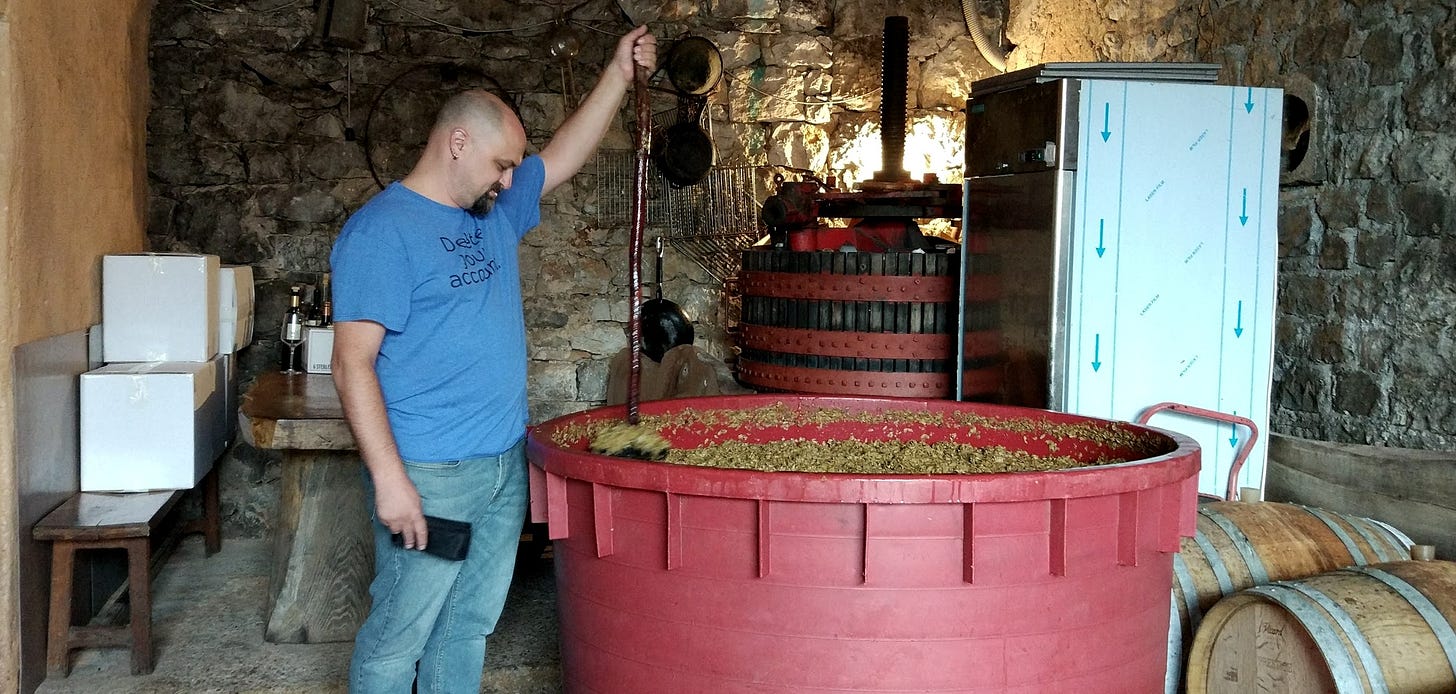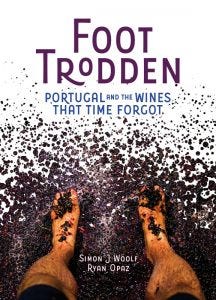Interview with Ryan Opaz - Foot Trodden co-author
I talk to my collaborator and good friend about his path to Portugal
I first met Ryan Opaz in 2011 when I attended the European Wine Blogger’s Conference in Brescia, Italy. Ryan had been organising the conference, together with his wife Gabriella and colleague Robert Macintosh since 2008.
As a very green wine blogger amongst many seasoned industry names, I did not expect to become friends with one of the conference organisers. But somehow that was what happened. Ryan and I shared a love of endless and often spirited debate on a range of subjects ranging from music to politics.
We first collaborated seriously on my book Amber Revolution, and out of that project came the genesis of a new one: Foot Trodden - Portugal and the wines that time forgot, our ode to Portugal and its wines.
We thought it would be a fun idea to interview each other. So here's my interview with Ryan. His interview with me can be found here.
SJW - You’ve had a very varied career, taking in art school, butchery and herding cats (aka organising a wine conference). How did you first fall in love with wine? Did you have an 'aha' moment?
RO - My dad was always more of a cocktail guy having dinner parties with friends where wine was served, but a gin and tonic or daiquiri was served first. I grew up in a house that canned its own vegetables and fruits and baked its own bread, so flavour was always important to me and I loved gastronomy. It wasn’t till after college that a friend of mine went hunting for some “popular wine” based on magazine reviews. I remember sitting in my post-college apartment with her and opening a California Zinfandel, dark, deep, rich, and thinking wow this is fun. I quickly ended up at my local wine shop and started working a few hours a week for the discount, and to learn more about wine and taste more. From there I never looked back.
When we first met, you were living in Spain. What took you to Portugal and how and why did the country capture your heart?
That is a long story. My first time in Portugal was 2003 for our [Gabriella and my] wedding. We didn’t have a ceremony - we just backpacked through the country tasting everything we could find. We chose Portugal because my family has a long history here, due to my aunt travelling here as an exchange student in the '70s. It's a great story revolving around a historic house and family here in Porto. That family is largely responsible for us choosing Porto as our home. When we decided to move to Europe in 2005, Gabriella chose Spain because of her family ties to Catalunya, but I always secretly hoped we’d end up in Portugal.
During the eight years we lived in Spain, I spent as much time as I could in Portugal. It was when Mica, our son, was due that we made the jump. Why? Well at that point all our closest friends lived in Portugal and being expats we needed that support to raise him. So it worked out well, and we are very happy to be here.
I’m interested in the whole ex-pat/immigrant thing, as I’m one myself these days. Does Portugal feel like home to you? If so, why?
As you know, as an expat/immigrant you will never feel 100% at home, and that’s OK. In truth I don’t even feel at home back where I grew up. Today Porto is home, it is where I feel most comfortable, where I dream about getting back to when I travel, and where I feel most welcome. There is always a bit of discomfort when you are an expatriate, as you will always not fit perfectly, and honestly I like that, it keeps me on my toes. All that said my son is Portuguese, and I’m hopefully on my way to a Portuguese passport, so I guess this is where I’m staying.
Do you remember that moment (I think it was at Oscar Quevedo’s house in the Douro) when we first talked about doing a book about Portugal? Why do you feel that this book is needed?
I remember so many conversations where we both suggested it. I do remember when we started to get serious, and I guess even then I wasn’t sure it would happen. Why is this needed? Well Portuguese wine needs a bit of poetry. I feel like the trade knows it’s a hidden secret, but the wider public still doesn't really know about it. I get that the Portuguese never really shout about themselves from the rooftops, but they should. Portuguese wine is really second to none in terms of quality and diversity and Portugal should be proud of this. I hope we create something that inspires more people to explore and discover these wines.
We've drunk a lot of wine together, everywhere from hotels in Turkey and Georgia to cellars in Italy and Slovenia. When it comes to Portugal, which bottles still excite you after all these years?
After all that wine, not sure I can remember! Honestly I hate ranking wines, regions, countries, every place we’ve been there are great wines, stories and people. That said, I live here and Portugal is what I know best. I am supposed to be the expert wine guide here at Catavino, and yet there are still wines to discover. And I don’t mean new producers popping up, but styles and grapes that are being rediscovered.
As for specific wines, I love finding old bottles in shops hidden in back streets. Old Colares for sure, and some of the newer projects out of the Dão and Bairrada. Also talha winemakers in the Alentejo who are finally coming out of the shadows and starting to bottle wines with gorgeous fruit and freshness.
All that said, one thing that continues to excite me is the Douro. When it started to commercialise its table wines it was fun and at the time very modern. But today there seems to be a whole new face of the Douro with elegant, delicate reds, and fresh zippy whites. The diversity that is possible there never stops surprising me.
Finally, what's your top tip for a food and wine lover who’s visiting Portugal for the first time?
Go slow. So many travellers want me to book a 3-4 winery day for them, and while we can, it’s not worth it. Portugal still has wineries where the owner will greet you when you arrive. Let them show you around and you may be invited to lunch, or at the very least get to taste something special. Portugal moves slow and that is what makes it special. Don’t be in a hurry, and don’t be afraid to ask people for help, they will go out of their way to help you if you let them. Finally, order the house wine. While not always the most expensive/fancy, a cheap Vinho Verde with a plate of fresh grilled fish is really about as good as it gets. Many times the wine is from the owner's homemade stash and often that wine is better than anything else on the menu.



